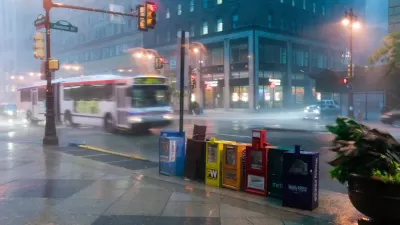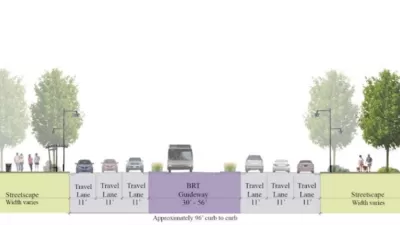Public transit is for everyone.
If you hadn't noticed, mode choice became the site of protest this week when the #DeleteUber campaign responded to last weekend's taxi strike. In response to the newly Uber-less, some are advocating less use of transportation network companies (TNCs) and more use of good, old-fashioned transit.
If you're looking for some inspiration to see the benefits of riding the bus, Eric Heiman has written just such an ode, celebrating the "necessary frictions" of public transit ridership.
The op-ed begins, however, with an acknowledgement of the frustrations of riding public transit.
Yes, public transportation is often crowded and I have to stand uncomfortably close to someone I don’t know. Yes, germs galore coat the aluminum poles and railings that we cling to for dear life when the inevitable, hard inchworm lurch of the bus occurs. (And, yes, I probably get sick more often because of touching them.) Finally, yes, Lyft, Uber, and Chariot are the more convenient, cozy, safe, and better-designed options.
But according to Heiman's account, the benefits far outweigh those drawbacks, for instance:
- The lack of a rating system on the bus. "There’s a social aspect to [transit], but not the pushy, faux one currently required any time I summon a rideshare car on my iPhone because I’m worried that the driver might give me a 4- rather than 5-star rating for my lack of small talk."
- "[T]here’s also a delicate we’re all in this together' camaraderie that binds us commuters…"
- "Even small mitzvahs occasionally squeeze in, such as when a young professional offers an elderly woman his seat, or the yells of 'Back door!' when someone struggles to exit from the rear."
Heiman shares more, but his conclusion is this: transit and the interactions and experiences it requires, feels genuine because it is genuine. What's more, the empathy Heiman gains on the bus makes him a better practitioner (he's a designer in the tech-booming San Francisco, as it turns out) and a better human.
FULL STORY: Necessary Frictions

Maui's Vacation Rental Debate Turns Ugly
Verbal attacks, misinformation campaigns and fistfights plague a high-stakes debate to convert thousands of vacation rentals into long-term housing.

Planetizen Federal Action Tracker
A weekly monitor of how Trump’s orders and actions are impacting planners and planning in America.

In Urban Planning, AI Prompting Could be the New Design Thinking
Creativity has long been key to great urban design. What if we see AI as our new creative partner?

King County Supportive Housing Program Offers Hope for Unhoused Residents
The county is taking a ‘Housing First’ approach that prioritizes getting people into housing, then offering wraparound supportive services.

Researchers Use AI to Get Clearer Picture of US Housing
Analysts are using artificial intelligence to supercharge their research by allowing them to comb through data faster. Though these AI tools can be error prone, they save time and housing researchers are optimistic about the future.

Making Shared Micromobility More Inclusive
Cities and shared mobility system operators can do more to include people with disabilities in planning and operations, per a new report.
Urban Design for Planners 1: Software Tools
This six-course series explores essential urban design concepts using open source software and equips planners with the tools they need to participate fully in the urban design process.
Planning for Universal Design
Learn the tools for implementing Universal Design in planning regulations.
planning NEXT
Appalachian Highlands Housing Partners
Gallatin County Department of Planning & Community Development
Mpact (founded as Rail~Volution)
City of Camden Redevelopment Agency
City of Astoria
City of Portland
City of Laramie





























